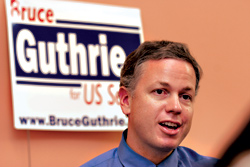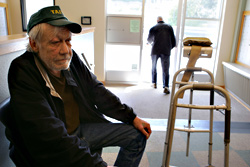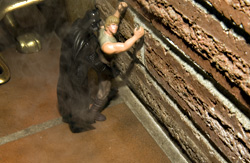NEWSPAPERS HAVE really only one obligation: to truthfully inform readers. Yet last week the King County Journal, a Bellevue-based daily serving the east and south suburbs, admitted failure to do even that in March 2002 when it printed a phony story about a suspicious fire that was actually staged by police to appear to be an arson.
This story starts in January 2002, when Steven Sherer was convicted of killing his wife; her body was never found. The conviction didn’t sit well with Sherer. From behind prison walls, prosecutors assert, he plotted to kill his former mother-in-law, his son, the prosecutor, and the prosecutor’s four children. For starters, he contracted with his cellmate to torch the Bellevue home where his former mother-in-law and his son lived, preferably with them inside, according to court documents. Law enforcement officials found out and decided to stage an arson at Sherer’s former mother-in-law’s in order to dig up more information about Sherer’s conspiracy.
One problem: The cops needed to somehow prove to Sherer that the arson happened. So they contacted the King County Journal. Would the paper be willing to report the staged arson as if it were a real event so that they could have a clipping to pass along to Sherer?
On March 22, 2002, law enforcement staged the arson at the Bellevue home. Thick smoke poured from the back of the house, Bellevue fire and police departments responded, and the next day the “event” was reported in the Journal as if it were a real-life fire. Sherer apparently bought the setup and last week was charged with criminal solicitation to commit arson.
But in its way, the Journal, too, had committed a crime: It lied to readers by printing a fiction and passing it off as the truth. In American journalism, there is no law per se, but there are accepted standards of conduct, and one of the things you never ever do, under any circumstance, is knowingly print a false story.
“Oh, god,” said Timothy Gleason, dean of the journalism school at the University of Oregon, after I showed him last week’s story in which the Journal fessed up to the deedand after he stopped chuckling. “The fundamental question here is the credibility of the news organization. If I’m a reader and I read a note like that, then that begins to raise questions of what else the paper isn’t telling us and what other agreements they have with authorities. The autonomy of a newspaper is critical to its credibility. If readers begin to believe it’s not an independent watchdog but part of law enforcement, it becomes more difficult for the paper to function as a watchdog.”
Of course, you didn’t need an expert to tell you that. Most people already have a good intuitive grasp of what newspapers aren’t supposed to do, like fabricate falsehoods.
So I called up Tom Wolfe, editor of the Journal, to see if perchance there was some legitimate reason for his paper becoming an arm of law enforcement. He told me that he and the paper’s senior editors discussed the matter and decided that in the name of public safety and community mindedness, they would publish the bogus storyand tarnish whatever of the paper’s reputation remains from its glory days as the Bellevue Journal-American.
“It’s a difficult choice,” Wolfe said. “We feel we’re really part of the community here and have more of an emotional attachment than a more distant paper might have.”
Whatever that means. I decided not to press the point with Wolfe. It was getting to the point where I’d have to ask him if he and the other editors had been smoking crack.
Sure, many reporters who’ve worked the law-enforcement beat have at some point in their career shared information with certain trusted cops. (I did it once, and though I didn’t feel too clean, it did keep someone from being shot.) But publishing fiction as a favor to law enforcementor to anyone for that matteris a line that you just don’t cross.
Editor’s note: Under a business agreement, the King County Journal prints Seattle Weekly.







